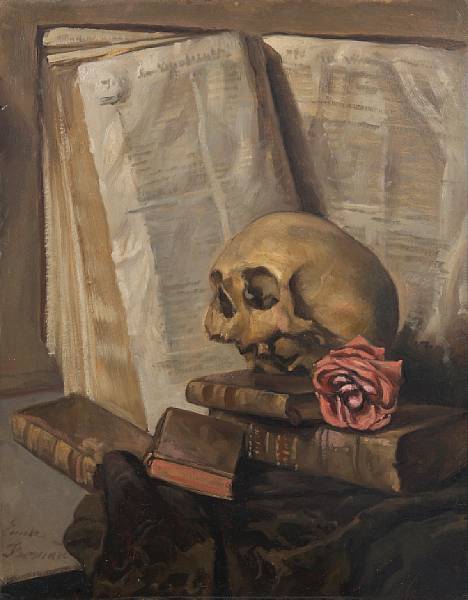Momento Mori

Memento Mori by Emile Bernard
“Remember that you are dust, and to dust you shall return.”
I still remember the first time a priest said these words to me as he inscribed a cross of ash upon my forehead. Though that act took place in a moment of ritual embedded in a long tradition, it was in that moment as if he, and God through him, were speaking to me alone. The words dripped with intentionality, vivid and sharp, and they pierced through my consciousness to uncover something deeper which always lay below—an awareness of death.
I am dying. Not in any dramatic and immediate way (to my knowledge), but death has been bearing down on me from the moment of my birth. As the priest placed those ashes on my head, I felt the horror and sadness of this fact, but I also felt release.
We live in a world where death is everywhere present, and yet forever removed from our consciousness. The meat we eat comes packed and clean, separate from the death that brought it to us. Our wars are fought with drones at a remote distance. The sick are kept in sterile hospitals, the mentally ill in institutions, and the old in care homes. Even biology tells us that our life is built on the death of countless creatures over millions of years before us, and yet we rarely face the sharpness of this fact. As Joseph Ratzinger said, “sickness and death are becoming purely technological problems to be handled by the appropriate institution.”[1] The tension of death’s simultaneous presence and absence places us in a psychologically untenable place. We know we are dying, we know others die, yet we are unequipped to face it—we lack even the language. One of the reasons Ash Wednesday is so powerful is that it brings us face to face with our death, reminds us with stark and powerful language what we are.
This reminder, that we are finite creatures, is healing for another reason as it tears down our own idolatrous pride. I love Ecclesiastes for this very reason, for this truth, in the end, is a great comfort, reminding us that we cannot accomplish everything, that we are not God that we should save the world, and this frees us for rest and play.
Or at least, it would, were it not for sin. In sin death becomes not simply a fact of the universe but our enslaver and the great chasm separating us from God. Thankfully, God never leaves us in the grave. The “hallelujah” of resurrection, silent during Lent, nevertheless still echoes in the silences of the liturgy, and the Ash Wednesday service itself ends with a collect that reminds us of God’s forgiveness:
Almighty and everlasting God, you hate nothing you have
made and forgive the sins of all who are penitent: Create and
make in us new and contrite hearts, that we, worthily
lamenting our sins and acknowledging our wretchedness,
may obtain of you, the God of all mercy, perfect remission
and forgiveness; through Jesus Christ our Lord, who lives
and reigns with you and the Holy Spirit, one God, for ever
and ever. Amen.
God reminds us of our death, but he also calls us out of death. He reveals our sins, He forgives them, and He calls us to grow into His love. Lent, as Justin so ably pointed out, calls us to live into the work of God, in hope of the resurrection which is to come.
As we go forward into this season of Lent, I say to you “Momento mori”—remember that you will die. But do not despair. Look instead to the one who came to save us from death, who descended even into godlessness for our salvation. I leave you with a section from one of my favorite Psalms:
For as the heavens are high above the earth,
So great is His mercy toward those who fear Him;
As far as the east is from the west,
So far has He removed our transgressions from us.
As a father pities his children,
So the Lord pities those who fear Him.
For He knows our frame;
He remembers that we are dust.
As for man, his days are like grass;
As a flower of the field, so he flourishes.
For the wind passes over it, and it is gone,
And its place remembers it no more.
But the mercy of the Lord is from everlasting to everlasting
On those who fear Him,
And His righteousness to children’s children,
To such as keep His covenant,
And to those who remember His commandments to do them. (Psalm 103:11-18)
[1] Joseph Ratzinger, Eschatology: Death and Eternal Life (Washington, D.C.: Catholic University of America Press, 2011), 70.
Kevin G.
Latest posts by Kevin G. (see all)
- All the Company of Heaven: Praying to the Saints - October 31, 2016
- C.S. Lewis, Roman Catholicism, and Bad Apologetics - August 1, 2016
- Sabbath and the End of Work - May 24, 2016
